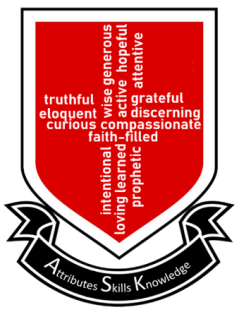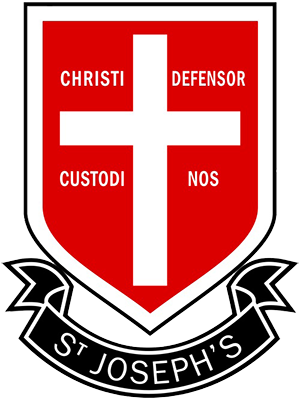Curriculum
Curriculum

Our curriculum intent is characterised by:
ASK
|
|
Curriculum Intent |
What it means |
Where it fits in scripture |
|
A |
Attributes |
Enriching students with gospel values and virtues. Equipping them with the attributes to change society for the better.
|
Mark 11:24 Whatever you ASK in prayer, believe that you have received it, and it will be yours. |
|
S |
Skills |
Developing cognitive fluency to enable Knowledge to be applied, analyzed and evaluated effectively. |
Matthew 7:7 -ASK, and it shall be given you; seek, and ye shall find; knock, and it shall be opened unto you. |
|
K |
Knowledge |
Academic Fluency; curriculum coherence is achieved through deep learning; utilizing Rosenshine’s principles to ensure Knowledge will be taught to be remembered effectively. |
James 1:5 If any of you lacks wisdom, let him ASK God, who gives generously to all without reproach, and it will be given him. |
Intent
- To unlock belief in all our learners:
Enriching students with gospel values, virtues, and attributes. Preparing them with knowledge, and equipping them with the skills to change society for the better.
Curriculum Principles Statement
In order to deliver on our vision of ‘unlocking belief in all’ we constantly review our curriculum offer to ensure it reflects the needs of each cohort and that it mirrors the unique interests and ambitions of each individual student. We view the curriculum as not being limited to subjects taught but as encompassing every aspect of school life, allowing each learner to experience both cognitive, ethical and moral fluency so that they can be agents of change in the world.
Social mobility is key to our mission; schema in each subject area is planned and structured to ensure each student is aware of end points embracing hard work, challenge and aspiration, striving to become autonomous learners. This approach has ensured that the majority of our learners progress to University, for the most of our students they are the first in their households to do so. Progress at St Josephs has been in the top 10 % nationally for the past 8 years, we view the curriculum is a vehicle for social mobility, closing the attainment gap, and ensuring the curriculum (both within subjects and beyond) gives students access to networks of career and employment advice and guidance.
Aims of the curriculum
- Academic Fluency; curriculum coherence is achieved through contextualizing current learning against prior and future knowledge.
- To Emphasize spiritual, socio-economic, and geo-political grand narratives, concepts and themes in each subject area assists students in understanding the ‘connectedness’ of the curriculum.
- To provide opportunity for both breadth and depth of learning through the careful sequencing of learning.
- To challenge the ‘hidden cultural subsidy’ by ensuring all students have equal opportunity. To ensure that all learners have the literacy and numeracy skills to analyse and evaluate knowledge and that funding for disadvantaged students is targeted and monitored to ensure curriculum access and progress.
- To provide opportunities to explore and develop cultural capital.
- To develop values, virtues and attributes to help students become better citizens and understand their journey of faith.
- To ensure students are equipped with the knowledge and skills required to secure relevant and enriching employment in a fluid employment market.
Local Context (New)
As a Roman Catholic school, who serve one of the most culturally diverse student bodies in the country, we encourage our learners to see their community and future opportunities on a global scale.
Local labour market information in Berkshire tells us that 36% of all jobs in Berkshire require degrees with 42% of all residents holding degree level qualifications. A further 56% of jobs demand mid-range qualifications however only a third of residents have their highest qualification at this level. Our alumnae will live and work across the UK, Europe and the world. We provide CEIAG support throughout the academic journey to allow each student to make appropriate choices to ensure continued employability in an employment landscape characterised by change.
Key Stage 3
All students at Key Stage 3 follow a common curriculum which has literacy and numeracy at its core. The curriculum in Key Stage 3 has been redeveloped for September 2022 by departments looking at sequencing the learning journey students are on and ensuring deeper learning is taking place, setting firm foundations for KS4. Departments have looked at the KS2 curriculum to ensure knowledge and skills are built upon appropriately. In particular, Year 7 students are studying an additional hour of English in order to ensure the necessary skills in reading, writing and oracy are fully embedded and supported, in light of the COVID-19 lockdown.
Literacy and Numeracy form an integral part of all subjects across the curriculum. Students in Years 7-9 undergo and thorough and enriching reading programme. Students who have been identified as requiring additional support in literacy follow the Hackney Literature Programme. The programme is designed to support those students in the following areas: reading, comprehension, vocabulary, writing in an academic register and ensuring that the students are using correct grammatical structures. We believe that it is imperative to ensure that all students are either achieving or surpassing their chronological age in Reading. Students who have been identified as requiring additional support in numeracy engage in Numeracy Support classes following the Passport Numeracy programme.
Key Stage 4
At key stage 4 students will follow a two year programme which enables teachers to develop the mastery required to be successful on the new GCSE courses and prepared for KS5 study. Over the two years students continue to study a broad and balanced curriculum consisting of our core curriculum and 4 additional options choices.
EBaccalaureate at the Core of our Curriculum
We are ambitious for our students, and see it as an issue of moral and social justice that our students do not settle for jobs less than their potential suggests they are capable of. In other words, should they have the potential, our students should have the opportunity and confidence to aim for the 36% of jobs which require a degree in the locality or greater.
Those students who have been identified as requiring additional support in literacy in Year 9 will follow a bespoke literacy programme that focuses on reading comprehension, vocabulary and developing the students approach to long answer questions. The objective of the programme is twofold: to ensure that the students are able to access the content in their GCSE examination, however also to ensure that the students can communicate effectively through their writing in a wider setting.
Key Stage 5
At Key stage 5 students generally study 3 A Levels culminating in exams after 2 years. Those students opting to study Maths or Science will study 4 AS levels in Year 12 before selecting 3 to take forward to A2. Some students follow a combination of BTEC and A Level Courses. The following subjects are currently available:
Biology, Chemistry, Physics, Media, Economics, Psychology, Geography, History, Law, Product Design, Sociology, Business Studies, Maths, Philosophy and Ethics, English Literature, English Language, French, Spanish, Computing, Art, Core Maths and BTEC in the following; Sport, Music, Travel and Tourism, Health and Social Care, Performing Arts.
For further information please refer to the Sixth form Prospectus.
Implementation
The curriculum takes into account the individual needs of students giving them a breadth of academic and personal development opportunities.
- The curriculum places an emphasis on deep learning, utilizing Rosenshine’s principles to ensure Knowledge will be taught to be remembered and Blooms Taxonomy, to ensure what is learned can be applied, evaluated and analysed effectively.
- Schema is sequenced coherently throughout the Key Stages, curriculum maps are referenced daily to ensure students understand the learning journey.
- Students will be set aspirational targets, the effective implementation of the curriculum will allow them to meet or exceed them.
- Enrichment outside of lessons, through clubs, societies, the church and extra-curricular trips allows students to test and apply knowledge in wider contexts.
- The effectiveness of implementation is constantly evaluated through the school quality assurance cycle. This review process informs staff development opportunities.
- Implementation is responsive: where assessment indicates that progress is inconsistent, targeted intervention and support or additional challenge will be put into place to ensure students meet.
|
Subject |
Key Stage 3 |
Key Stage 4 (Path 1) |
Key Stage 4 (Path 2) |
|
Y7-9 |
Y10-11 |
Y10-11 |
|
|
11-13yrs |
14-16 years |
14-16 years |
|
|
English Language |
X |
X |
X |
|
English Literature |
X |
X |
X |
|
Mathematics |
X |
X |
X |
|
Science |
X |
X |
X |
|
Religious Education |
X |
X |
X |
|
PSHE & Citizenship |
X |
X |
X |
|
Physical Education (non- examined) |
X |
X |
X |
|
Modern Foreign Languages |
X |
X |
option |
|
Geography |
X |
|
|
|
History |
X |
||
|
Art & Design |
X |
option |
option |
|
Business Studies |
n/a |
option |
option |
|
Business Studies - Enterprise and Marketing |
n/a |
option |
option |
|
Child Development |
n/a |
option |
option |
|
Computer Science |
X |
option |
option |
|
Design & Technology |
X |
option |
option |
|
Drama |
X |
option |
option |
|
Food Preparation and Nutrition |
X |
option |
option |
|
ICT |
X |
option |
option |
|
Music |
X |
option |
option |
|
Physical Education (Sports Science) |
X |
option |
option |
For further enquiries regarding the curriculum please contact our Curriculum Leader:
Mr J Sindall - j.sindall@st-josephs.slough.sch.uk alternatively contact 01753 524713.
